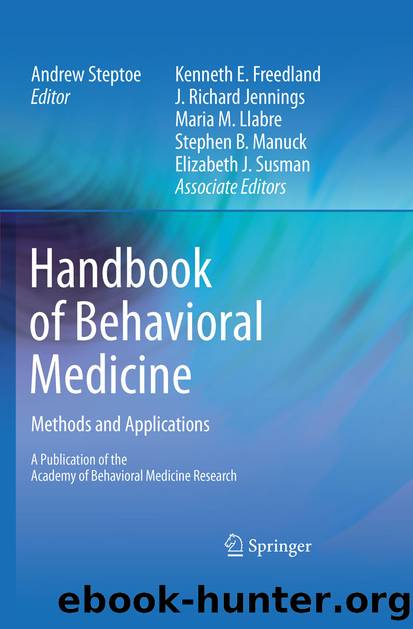Handbook of Behavioral Medicine by A. Steptoe

Author:A. Steptoe
Language: eng
Format: epub
Publisher: Springer New York, New York, NY
2 Life Course Epidemiology
A life course approach to epidemiology is concerned with the effects on health and health-related outcomes of biological (including genetic), environmental, and social exposures during gestation, childhood, adolescence, young adulthood, and across generations (Kuh et al, 2003). It specifically investigates how risk and protective factors across life act independently, cumulatively, and interactively. Much of the interest in life course epidemiology has centered on chronic diseases (Kuh and Ben-Shlomo, 2004a), such as coronary heart disease, diabetes, and cancer, but its concepts can also be used to understand health behaviors (Schooling and Kuh, 2002). The life course approach to health behaviors can address a range of questions that are highly pertinent to the development of health policy. Does childhood socioeconomic environment influence the consumption of excessive alcohol or binge drinking and is this modified by education and adult socioeconomic position? Could the link between adverse health behaviors and chronic diseases be due to a common set of factors that affect them both and if so when should one intervene, and what are the best ways of avoiding adverse health behaviors? Do the methods and cost-effectiveness of different interventions differ for children and adults? Would family-based interventions, aimed at preventing adverse health behaviors in all family members (adults and children), provide the most cost-effective means of preventing poor health behaviors and their health consequences (Lawlor and Mishra, 2009b), or should one go for a population approach that aims to shift the whole distribution of behaviors in a more favorable direction? (Rose, 1992).
At the heart of this life course perspective lies a unique theoretical framework that assumes and tests for a temporal ordering of exposure variables and their inter-relationships with the outcome measure, both directly and through intermediary (mediating or modifying) variables (Ben-Shlomo and Kuh, 2002; Kuh et al, 2003).
Download
This site does not store any files on its server. We only index and link to content provided by other sites. Please contact the content providers to delete copyright contents if any and email us, we'll remove relevant links or contents immediately.
| Administration & Medicine Economics | Allied Health Professions |
| Basic Sciences | Dentistry |
| History | Medical Informatics |
| Medicine | Nursing |
| Pharmacology | Psychology |
| Research | Veterinary Medicine |
Periodization Training for Sports by Tudor Bompa(8242)
Why We Sleep: Unlocking the Power of Sleep and Dreams by Matthew Walker(6689)
Paper Towns by Green John(5171)
The Immortal Life of Henrietta Lacks by Rebecca Skloot(4570)
The Sports Rules Book by Human Kinetics(4374)
Dynamic Alignment Through Imagery by Eric Franklin(4202)
ACSM's Complete Guide to Fitness & Health by ACSM(4046)
Kaplan MCAT Organic Chemistry Review: Created for MCAT 2015 (Kaplan Test Prep) by Kaplan(3994)
Introduction to Kinesiology by Shirl J. Hoffman(3757)
Livewired by David Eagleman(3757)
The Death of the Heart by Elizabeth Bowen(3599)
The River of Consciousness by Oliver Sacks(3590)
Alchemy and Alchemists by C. J. S. Thompson(3506)
Bad Pharma by Ben Goldacre(3415)
Descartes' Error by Antonio Damasio(3264)
The Emperor of All Maladies: A Biography of Cancer by Siddhartha Mukherjee(3135)
The Gene: An Intimate History by Siddhartha Mukherjee(3087)
The Fate of Rome: Climate, Disease, and the End of an Empire (The Princeton History of the Ancient World) by Kyle Harper(3051)
Kaplan MCAT Behavioral Sciences Review: Created for MCAT 2015 (Kaplan Test Prep) by Kaplan(2975)
